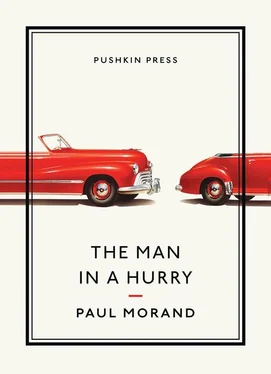“As they say where I come from, monsieur, men are not made for time, but time is made for men…”
A ring at the doorbell interrupted the manservant; he disappeared, but came back bringing a scrap of paper with a name written in pencil.
“It saves having to have visiting cards,” he said disdainfully.
Pierre read:
MADEMOISELLE HEDWIGE DE BOISROSÉ
Pierre immediately took the usual precautions. He had a whole arsenal of defensive procedures with which to protect himself from bores: he hid the chairs in a way that would deter the visitor from settling down permanently, he opened the windows to let in a chilly breeze; the lady would not stay for long. In order to be safer still, Pierre donned a fedora (it was simply a sign that he was about to go out, for he put nothing on his head outside and generally he wore no overcoat because of the time it took getting into the sleeves). He grabbed his gloves in one hand and his umbrella in the other.
He glanced again at the piece of paper, his eyes fixed on the name.
“This visit may produce cheap cards, but a wealth of tedium,” he thought to himself.
He almost said “I’ve gone out”, but he could sense the presence on the other side of the wall of a solitary woman who would be determined and would return.
“I will see this lady,” he said, dismissing Chantepie, who was standing to attention.
Hedwige entered. Hedwige in mourning in the totally white room; merely the simple, slow movement of her feet, with just enough delicacy to make her gait seem beautiful. Unaware of what he was doing, Pierre laid his hat on the table; this woman had something about her, but what was it? Hedwige removed her veil. The crêpe material, emblem of that which no longer exists, had the ability to move Pierre deeply. This cinder-like substance, worn in mid-morning over this youthfulness and beauty as though to cushion the shock, attired Hedwige with a Spanish modesty, and endowed her with the melancholy of a grave that is never visited. This tall young woman, an exquisite image of misfortune tinged with the leaden effect of crêpe, resembled a pole flying the flag at half-mast.
“It is you, monsieur, is it not, who bought the Mas Vieux from my father, Monsieur de Boisrosé?”
Pierre admired the pearl-like complexion, not yet ravaged by the sun like the skins of fashionable girls, but so opaque with light and freshness; the slight quivering of the crêpe, its waviness and the rustle of its black material, screening the light, succeeded in enchanting him.
“It is you?” Hedwige asked again.
“Yes, mademoiselle,” said Pierre automatically.
A curious feeling came over him; he felt disengaged, freewheeling, and was descending effortlessly, as though in a dream, into a sense of unfamiliar well-being. This blindingly white room, which he had just emptied and allowed his ally the cold to come into, was turning into a warm Oceanic night. Pierre was discovering a part of himself that he was unfamiliar with and in which he moved with surprising ease. He happened to notice himself in the mirror and he thought he had changed, become more attractive in appearance, more imposing. His eyes met Hedwige’s.
“Why are you laughing?” he enquired.
“Because you had forgotten I was there; I saw you in the mirror: when one looks at people face to face one can see them, but when one looks at them in the mirror one understands them.”
“What you say is not at all foolish,” said Pierre. “Do you read much?”
“Never; I don’t like cutting the pages.”
“I cut them with my finger.”
They burst out laughing, both of them delighted to be laughing simultaneously over something so deeply ridiculous. A picnic-like gaiety spread through this room in which the onlooker would have seen only a tall girl dressed in black and a tall young man in grey, four walls that were so white that they gave you a pain in the optic nerve and the sinus, a steel desk, two telephones, some electrical wires, an electric heater and some wax-cloth curtains.
Hedwige slipped her finger under the white crêpe band beneath her chin, which was strangling her laughter. This reminded her that she had come dressed for serious matters.
“Monsieur, I hope that you won’t be offended if I take the liberty of asking you a few questions.”
Pierre made a polite gesture.
“To whom, please, did you pay the money for the Mas Vieux?”
“To your father, naturally.”
“And do you know what he has done with it? Whether he has paid it to the lawyer or to someone else?”
Pierre was evasive:
“Goodness me, how should I know?”
She pursued the matter:
“You were probably in my father’s bedroom, since he was very ill. Did you not notice anything?”
“Is this a cross-examination?” said Pierre.
These questions were becoming annoying.
“This money…”
Pierre could feel the pressure almost physically, as though he were being woken up; his nerves strained to resist; he remained motionless for a brief moment, then suddenly something clicked inside him and the whole machinery started up: time, which for an instant was suspended in mid-flight like a bird gliding, was set in motion; once again, Pierre had re-engaged the clutch. In a trice he glanced at his watch, tossed his cigarette away, rang the bell and without waiting opened the other window and both doors, shouting:
“Chantepie! Chantepie, my watch has stopped yet again.” (He shook his arm as though he were drowning.) “What time is it on the kitchen clock?”
“It says almost midday,” Chantepie replied.
“A taxi, right away!”
“Are you in a hurry?” asked Hedwige in astonishment.
“I’ve only got time to dash… Don’t worry, I’ll be back… tomorrow or the day after… I’ll call you on the telephone… we’ll sort it all out,” yelled Pierre, who was already descending the stairs, one sentence on each landing. (Ever since he was at the lycée , he had held the record for descending the staircase.)
Once he was downstairs, Pierre stamped around in the porter’s lodge, fulminated on the pavement, stood in the very middle of the road, complained about the concierge’s husband who didn’t know how to run, dispatched Chantepie to search for a second taxi, then eventually jumped into a cruising cab without waiting any longer. He set off just at the moment when both taxis arrived outside his door one after the other, one with the concierge on the back seat, the other with Chantepie perched on the running board, both of them waving madly, but ineffectively.
“He’s a lunatic,” said the taxi driver.
“He’s a butterfly,” said Chantepie poetically.
“He’s a nincompoop,” said the concierge.
THE EARLY AFTERNOON SUN beamed down on the snow with which a gust of slanting east wind had prematurely whitewashed Paris; the snow kept nothing to itself, it reflected the warm light, now grown cold, in every direction, emphasizing aspects of the houses, darkening the bare trees, transforming pigeons into crows, tinting blonde girls into Negresses and brushing the whitest dogs with a coat of saffron yellow. The cars were causing the ice to crackle and were tracing flourishes in the streets. Concierges were scraping the doorways with coal shovels while melting stalactites dropped on their heads from the tops of cornices.
Meanwhile, at Saint-Germain, the minutes ticked by sluggishly. (The Boisrosé ladies, a curiously lethargic crew, pay no heed to passing time, nor to celestial trajectories; they could not care less whether it is the sun or moon that is reaching its zenith and, according to their whims, they can transform the brightest day into dusk by drawing the curtains, or the darkest night into a blaze of electric light.)
Читать дальше












